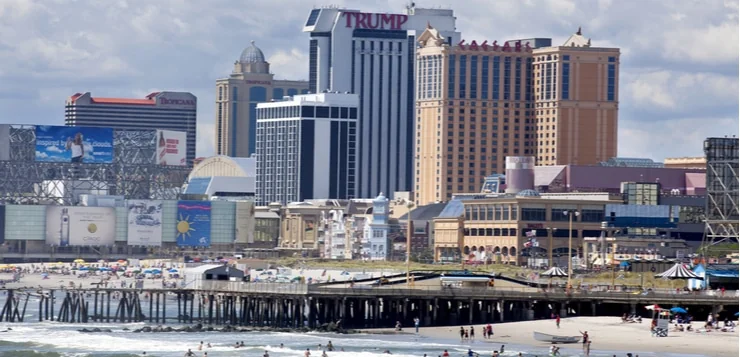Atlantic City Mayor Marty Small recently spent the first half-hour of his annual State of the City speech painstakingly detailing one project site after another under development in the city.
But Small, a native of the city, saved for last what he clearly considered the most important piece of that development puzzle: the Trump Plaza casino site on the historic Boardwalk.
“Now that all the hoopla is done, we still have to clean up eight stories worth of debris,” Small said even before last week’s implosion. “But I’m not concerned about that. I’m concerned about the rebuild.
“And as hard as I have worked to get this building down, I’m going to make the same effort and energy to to work with [billionaire site owner] Carl Icahn and his group to bring in an exciting development.”
Small referenced the potential help of Lt. Gov. Sheila Oliver, who attended the Feb. 11 speech, as he noted of the site, “You only get one shot — oceanfront property doesn’t become available very often.”
As commissioner of the state Department of Community Affairs, Oliver presides over the state’s five-year-old management of the city’s finances that began under previous Gov. Chris Christie.
Small talk: not another casino
The potential involvement of the state and the city in the site will take the cooperation of the 85-year-old Icahn, a real estate mogul who also bought and then sold the defunct Trump Taj Mahal property in 2016-2017.
That property was reborn as Hard Rock Atlantic City, which since it opened 2 1/2 years ago has become among the most successful of the nine current casinos in the city.
The same is true of Ocean Casino Resort, which opened on the same day as Hard Rock after the former Revel casino site was gutted and rebranded.
Former President Donald Trump’s other former Atlantic City casino — Trump Marina — was remodeled a decade ago into the Golden Nugget.
So it’s noteworthy that in the case of Trump Plaza, the “bones” of the 38-story building were demolished instead of renovated.
Still, a broad zoning permit for the site allows for the construction of another casino as well as a hotel, high-rise casino, restaurants, government buildings and many other options.
But after last week’s implosion, Small told reporters: “We’ve got to diversify our offerings. We can’t be dependent on casino gambling any more.
“We’re always going to be a casino town — we love the jobs and the opportunities that they provide. But it’s time to take the shift to make us different than every other town, near and far, that now has casinos.”
Is Las Vegas a model for Atlantic City?
The city had 12 casinos until 2014 — a number Wall Street casino industry analysts had considered unsustainable ever since the opening of a series of casinos in eastern Pennsylvania in 2006 almost simultaneous to the addition of thousands of slot machines at New York’s Yonkers Raceway and Aqueduct horse racing tracks.
The shoe finally dropped seven years ago when four Atlantic City casinos shuttered only months apart, with Trump Taj Mahal closing as well in 2016.
Small’s dream of a non-gambling project — he hasn’t committed to just what — and diversification of attractions echoes the blueprint of Las Vegas, which more than a decade ago began a successful shift away from what city leaders saw as an overreliance on gamblers to drive the city’s economy.
The bulk of revenues in that city now comes from non-gaming spending, with many tourists who visit focused more on spas, nightclubs, high-end retail, and fine dining than on a visit to the casino floor.
The Trump Plaza footprint always has been an ideal location, something that Trump shrewdly exploited when the casino opened in 1984. Right next door is the iconic, built-in-1926 Boardwalk Hall, which now is named in honor of former Atlantic City Mayor and state Senator Jim Whelan.
Major boxing and wrestling competitions at Boardwalk Hall were promoted by Trump nationally as being located at his casino hotel, lending a further air of prestige to a city that enjoyed an east-of-the-Mississippi legal gambling monopoly throughout the 1980s.
If it looks like Ducktown…
But now local leaders are touting the idea of a greenscape or promenade for the Trump Plaza site to add to the appeal of the city beyond casinos, the Boardwalk, and the Atlantic Ocean.
A report published in 2019 called “The Ducktown Neighborhood Revitalization Plan” that includes the Trump Plaza site recommended “an Atlantic City Live! type development with eateries, shops and entertainment venues. Mixed use development including hotel accommodations, offices and condominiums could also be developed.”
Trump Plaza’s parking garage remains intact, and the report recommends that it be “reskinned to eliminate the blank wall that currently exists and include an art theme to complement the Arts District.” Two-story and three-story townhouses above first-floor commercial businesses also were recommended.
“The redevelopment of the Trump Plaza site … would have considerable impacts on Ducktown and would represent one of the largest redevelopment sites in Atlantic City’s recent history,” according to the report.
In Small’s annual address to residents, he also touted the $100 million water park planned along the Boardwalk — a project that just happens to turn a former casino, in this case Showboat, into a non-gambling tourist attraction.
Small said that developers will break ground “in a couple of months” and that the all-glass structure will feature a retractable roof.
Small’s plan to have a charity auction to allow the winner to “push the button” on demolition of the site drew national attention, but Icahn scuttled that idea and instead announced he would donate $175,000 to the Atlantic City Boys & Girls Club, which was the intended recipient of auction funds.
The city’s six Boardwalk casinos are Hard Rock, Ocean, Caesars, Tropicana, Resorts, and Bally’s, with Borgata, Golden Nugget, and Harrah’s located in the Marina District.





